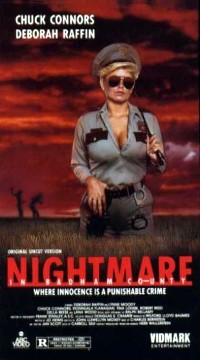
NIGHTMARE IN BADHAM COUNTY
US, 1976, 120 minutes, Colour.
Deborah Raffin, Lynn Moody, Church Connors, Robert Reed, Ralph Bellamy, Fionnula Flanagan, Della Reese, Tina Louise.
Directed by John Llewellyn Moxey.
Nightmare in Badham County is an effective melodramatic telemovie with social comment. Audiences can identify easily enough with the two heroines, college students touring on holidays and entering into disruptive events which change their lives. The film offers an ugly picture of a small town, the picture of corruption in police and officials as portrayed by Chuck Connors, Robert Reed and Ralph Bellamy is quite disturbing. The film also portrays a women's prison and its hardships - in the traditional manner of women's prison films like Caged and such reformist films as the Robert Redford feature Brubaker. The expected material is present and is still frustrating for the audience sympathising with the heroines and their being imprisoned unjustly as well as their attempts to escape. Deborah Raffin is an attractive heroine and the film, though somewhat lurid and melodramatic at times, is effective in disturbing the audience and making them sympathetic towards prison reform.
1. The impact of melodramas like this on a home audience?
2. The emotional response to the heroines, their situation, victimisation, prison life, frustration? The portrayal of facts and audience knowledge of prison abuse? The need for social awareness and reform?
3. How well did the film quickly sketch in the atmosphere of the American roads, towns, people, prison life? The conventions used and audiences accepting these within the brevity of the film's running time?
4. Audience response to the two girls? their holiday, sightseeing, the changing of the wheel, their friendship with the negro who helped them, their smart attitudes towards the sheriff, the lack of proportion of his vindictiveness towards them? How well did the film sketch them in as persons? Audience sympathy for the sheriff victimising them, their rudeness to him in the restaurant, his manipulation to keep them in the town, the excessive money charges? The building up of the atmosphere for their desperation, the night in prison, the rape? The people in the town not wanting to know this? The build-up to the court case and their further victimisation - with the complicity of the judge?
5. The portrayal of the sheriff and his arrogance, racism, his pride, revenge, the rape, his pressure on the judge, on the garage man? The judge and his seeming administration of justice ? and his being pressurised by the sheriff? The head of the prison and his suave manner, his using the women prisoners as servants, sexual purposes, responsible for their deaths, the cover-ups? A portrait of official American corruption?
6. The ugliness of the rape sequence and its dramatic impact? Audience revulsion for the sheriff? The sheriff's beating his victim? Humiliation?
7. The injustice of the long sentence to prison? The trustees and their running of the prison? Their violent methods, abuse?
8. The two heroines, one black, one white? The point made about black and white in America? The details of life in the prison and their separation into racial groups? Sequences at meals, at work, fights, dormitories? The staging of fights to further victimise the prisoners?
9. Cathy and audiences seeing things through her eyes? Her need to get to the phone, her attempts at the party, her various appeals, her being violently beaten?
10. Diane and her being imprisoned with the black women, their varying attitudes towards their imprisonment, their crimes, their being victimised? Heir opportunity to escape in the bus and being brought back?
11. The final plan for the escape ? Diane and her decision to lead off the sheriff with the consequence of her death? Cathy and the tension about the phone call and her father coming?
12. The attitudes of the trustees towards Cathy ? subservience, violent rejection, dislike and hatred? The head of the prison and his smooth talking? Cathy's father and the threat of the exposure? The digging up of the graves and the revelation of the abuses?
13. Audience response to prison films? Disgust at abuses? A picture of society's attitudes in a government allowing such prisons to exist? The film's emphasis on need for reform?